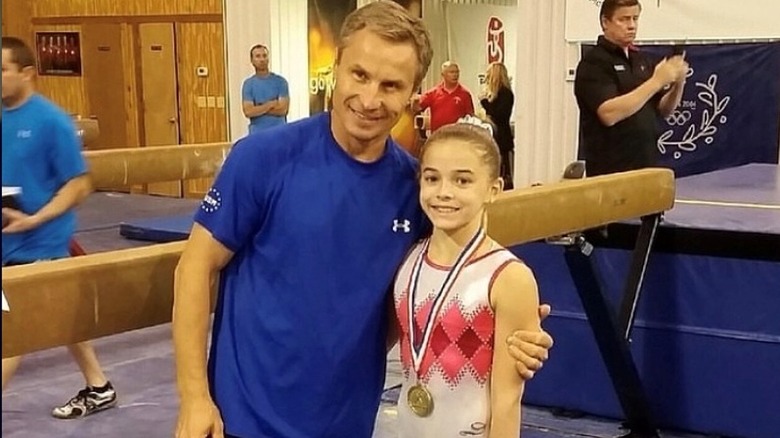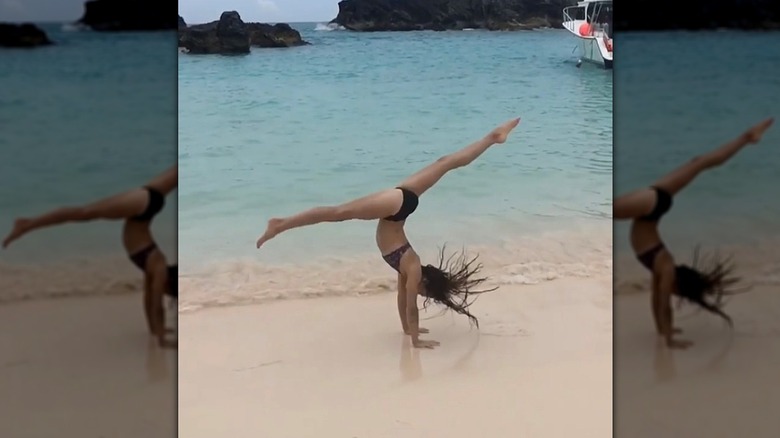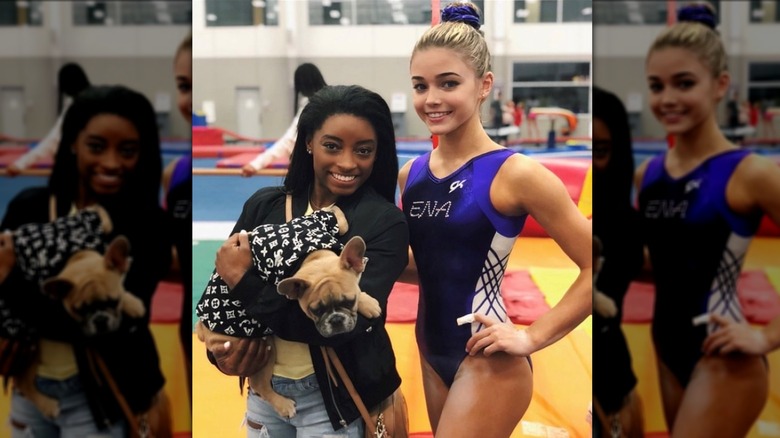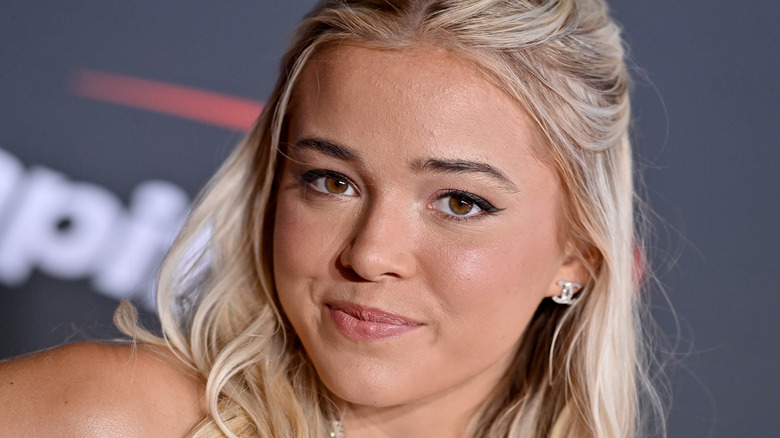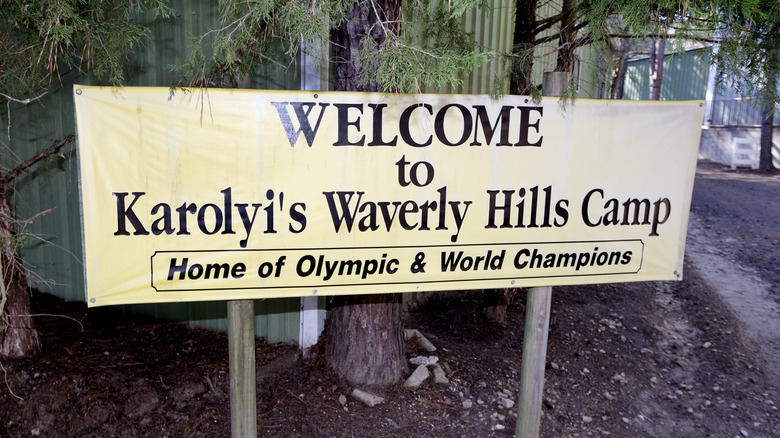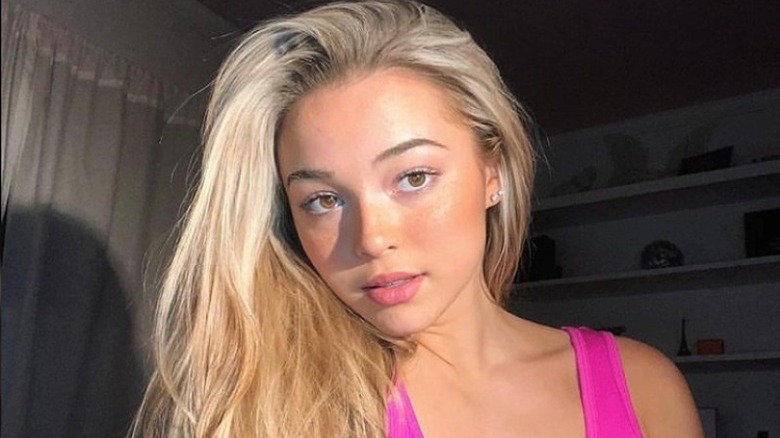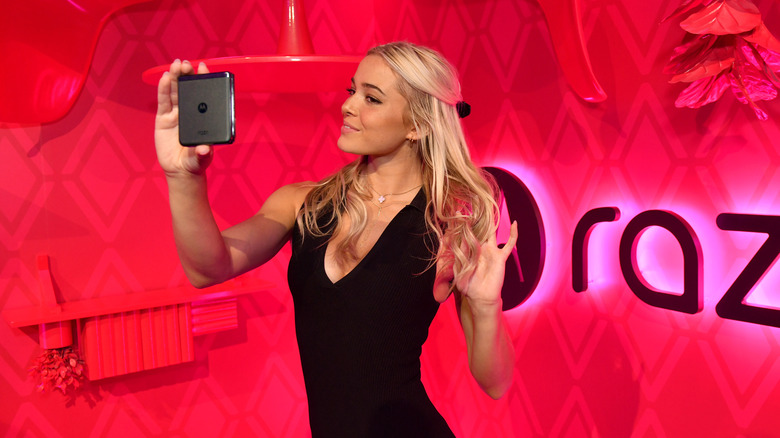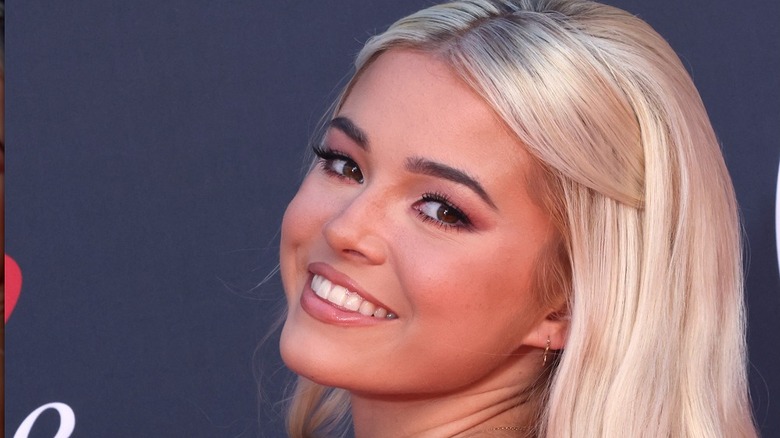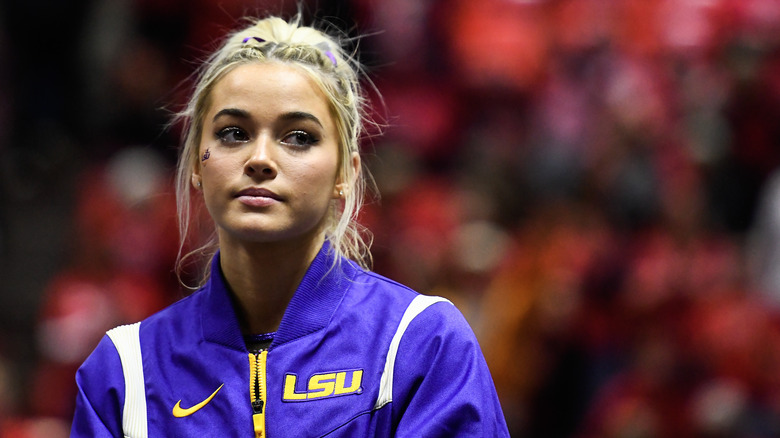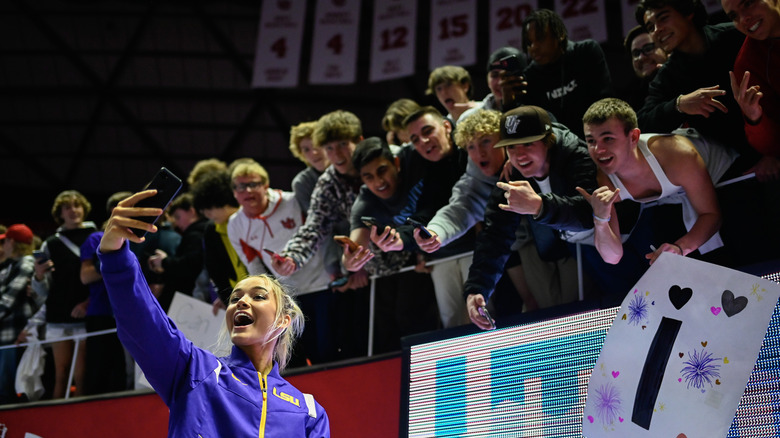The Stunning Transformation Of Gymnast Olivia Dunne
The following article contains references to sexual assault.
On June 30, 2021, the National Collegiate Athletic Association announced its historical decision to overturn a 115-year prohibition on students earning profit from their name, image, and likeness (NIL). "This is an important day for college athletes since they all are now able to take advantage of name, image, and likeness opportunities," NCAA President Mark Emmert explained in a statement. "With the variety of state laws adopted across the country, we will continue to work with Congress to develop a solution that will provide clarity on a national level." For many college athletes, it was an exciting moment — but for gymnast Olivia Dunne, this was more than just a statement.
"That was the moment my life changed forever," Dunne told Elle in an interview. "That was surreal," she said. "I didn't really know what was to come, but I knew it was going to be special." At the time, Dunne was already the most-followed college athlete on social media, so the chance to monetize that success would be monumental for the gymnast. Soon, she was able to snag endorsement deals, which allow her to rake in millions of dollars per year.
But before Olivia "Livvy" Dunne was a beloved social media star and millionaire, she was just a regular young girl growing up in a New Jersey ranch house with her family. Here, we're taking a closer look at the incredible transformation of Olivia Dunne and how she is forever changing the game for women student athletes everywhere.
Olivia Dunne started gymnastics because she wanted a 'pink, sparkly leotard'
Olivia Dunne was raised in Hillsdale, New Jersey. Dunne's mother is a former gymnast, and her father had played college football at Rutgers University. When Dunne was 3, she noticed that her older cousin, Isabella, had something she knew she needed: a pink, sparkly leotard. "I was like, 'Mom, I want that,'" Dunne told Elle. "And she said, 'Well, you can't have a leotard unless you do gymnastics.' So I was like, 'Sign me up.'"
Dunne remembers the strength she had at a very young age; she was quickly able to hold herself up on the men's rings at a Hillsdale gym with no trouble at all. By the time she was 6, she was taking classes at ENA Gymnastics in Paramus, New Jersey, where her coaches noticed her natural talent. "She's very strong, but she is very smart about what she does and she learns very fast," coach Craig Zappa told NorthJersey.com when Dunne was 12. "Most skills that take a lot of kids a couple of months sometimes she can just pick it up in two days or one practice and just move it through."
Gymnastics training is divided into levels, ranging from 1 through 10 — with 1 being the easiest and 10 being the most difficult. Dunne began as a level 4 at ENA when she was 6, but Zappa almost immediately bumped her training up to a level 10. From there, she won several state championships and skipped several levels, putting her at a competition level 10 by the time she was 10.
She made her elite debut in 2014
When a gymnast reaches level 10, they have the choice to stay at that level and possibly receive college scholarships, or they can opt to aim for the elite level. In order to qualify for elite, the gymnast must score 51.5 or better, which takes an incredible amount of practice and dedication to achieve. For Olivia Dunne, there was no question which option she was going to choose. "I knew I was going to make it," she confessed to NorthJersey.com. "I had confidence in myself." And she was right. Dunne scored 52.75 in May of 2014, which boosted her up to a junior international elite level and made her the youngest elite competitor in the United States at the time.
After achieving elite status, she made her first competitive debut at the American Classic in Huntsville, Texas, on July 5, 2014. Although she placed 28th in the competition, Dunne was competing at a difficulty level of girls much older than her and was able to show off the major potential and talent that she had. Around this same time, she was becoming more invested in social media, which she admitted to being on "morning, afternoon, and night." "I was 10 or 11, and there were younger girls looking up to me and people starting to recognize me," she told Elle. "To be someone else's role model meant the world to me."
So, naturally, she began posting her new gymnastics skills, tricks, and training practices. "Livvy was so cute with it," ENA coach Jen Zappa shared with Elle. "She would work so hard to master a skill, and then she would want to get the perfect version on camera."
She was homeschooled so she could focus on gymnastics
By the time Dunne reached seventh grade, her mother, Kat, opted to homeschool her so she could put most of her efforts into training. During her homeschooling, Kat made sure to teach Olivia the importance of using social media to her advantage.
"My kids all grew up with technology in their hands, and I've always been a big advocate of putting technology in the hands of kids and teaching them how to use it safely," Kat explained to Elle. "If you're going to have your phone in your hand, don't just scroll through — let's make content, let's do something. So many parents treat technology in the opposite way. They think of it as just, 'You're wasting your time.' But if that's what your child is interested in, then what can it become?"
Aside from wanting more time to train, the decision to homeschool Dunne likely also came from the fact that from a young age, everyone knew she would be able to hand-pick any college she wanted to attend. However, this choice came with a price. Dunne admitted to getting lonely and feeling as if she was missing out by not attending public school. To combat these feelings, she would go to football games at her former school and catch up with friends she hadn't seen during the week. When kids would ask how her training was going, it made her feel special and reminded her why she was doing what she does. "Not a lot of people get to do this," Dunne told the Pascack Valley Daily Voice in 2016. "I try to cherish every moment."
Olivia Dunne had to train at the infamous Karolyi Ranch
In 2017, Olivia Dunne made the USA Gymnastics Women's Junior National Team — but competing at that level also meant training at the Karolyi Ranch in rural Huntsville, Texas. The 2,000-acre center was created for training the top female gymnasts in the United States. During the ranch's time as the U.S. Women's National Team Training Center and a U.S. Olympic Training Site, there was much more going on beneath the surface than just a "fun summer camp" — which Dunne admitted to initially thinking it was in Elle.
In 2018, gymnasts began stepping up and speaking out publicly against Larry Nassar, the team doctor at the ranch. Many alleged that they had suffered sexual abuse at the hands of Nassar, and that these occurrences had been going on for years within the grounds of the training center. Nassar claimed his actions were for medical reasons, and journalists reported that Bela and Martha Karolyi knew what was going on but chose to do nothing. Moreover, the Karolyis themselves allegedly inflicted verbal and emotional abuse and fear tactics on the gymnasts.
Dunne recalls her years at Karolyi Ranch as "abusive," but she knew that going there was the only way to achieve her dreams. The Nassar investigation was an emotional time for everyone involved in gymnastics. Nassar was sentenced to life in prison, and the ranch permanently closed.
If you or anyone you know has been a victim of sexual assault, help is available. Visit the Rape, Abuse & Incest National Network website or contact RAINN's National Helpline at 1-800-656-HOPE (4673).
She made her senior elite debut in 2018
In spring 2017, Dunne accepted a full athletic scholarship to Louisiana State University with the intention of beginning college in 2020. That year, she also won three medals at the U.S. Classic in Chicago, along with additional medals at the P&G Championships in California. She made her senior debut in 2018 in Jesolo, Italy, which she said was "really, really fun." In an exclusive interview with FloGymnastics, Dunne explained how pleased she was with her overall experience in Italy. "I went with a bunch of my friends, I made my routines, and I was really happy about that," she said.
Shortly after she got back, Dunne suffered an ankle injury. She took most of 2019 off to recover, but that didn't stop her from pushing forward. "As long as I'm training my hardest," she told FloGymnastics, "I know I'll compete my best." Dunne signed her National Letter of Intent (NLI) to LSU for gymnastics on a full athletic scholarship in the fall of 2019. In sports, student athletes sign an NLI as a binding agreement that will provide them with financial aid in exchange for committing themselves to that school for at least a year.
For Dunne, beginning college was a major step because one of her goals is to amplify the presence of college sports. "As a female athlete, I hope I can bring attention to how amazing college sports are and how hard college athletics are," she told Sports Illustrated. She added, "In gymnastics, a lot of people only watch the Olympics every four years, and I feel like I've been able to use my platform to bring an audience to college gymnastics, and people are starting to see how amazing all these gymnasts are."
She joined TikTok in 2020 and became the most followed college athlete on social media
When the spring of 2020 hit, Olivia Dunne was on vacation with her family in Florida. They found themselves stuck on its beaches amid the national lockdowns, so she figured she should try and make the most of her time there — after all, there are far worse places to be on lockdown. During this time was also when the now mega-popular TikTok app was on the rise, so, naturally, Dunne shifted her social media gears to posting on the platform. She began posting simple TikToks of herself demonstrating various moves on the beach, and soon started calling the series "beach-nastics."
The videos were met with millions of views and thousands of comments praising Dunne's talent and beauty. In a very short amount of time, her TikTok audience grew, gaining hundreds of thousands of new followers each week. "My videos started to get shown, which was so cool," Dunne said in an interview with LSU Tiger TV. "And I would make videos mostly about gymnastics at first, and then people; I realized people liked to see more of, like, my life and what I do."
By late summer 2021, Olivia Dunne became the most followed college athlete in the world and has since accumulated a combined 12 million followers between TikTok and Instagram. Unfortunately, she wasn't able to profit from this right off the bat due to NCAA restrictions.
Olivia Dunne's high follower count brought her a slew of endorsement deals
Considering how hard Dunne worked for her skill set and, in turn, her popularity for these talents, the NCAA prohibition of student athletes earning profit from their names was arguably unfair. But it wasn't just Dunne, her family, and fans who took notice of this — student athletes across the country were only being compensated with education-related benefits like free laptops and post-graduation internships, so they felt it was time to fight back. Students took their issue to court, arguing that these restrictions violated federal antitrust laws by not allowing college athletes to receive adequate compensation for their labor.
Finally, in June 2021, the courts ruled unanimously in favor of student athletes, lifting the ban on using their name, image, and likeness for profit. For male athletes, this was an exciting feat, but for women athletes like Dunne, it was life-changing. "With gymnastics, you peak when you're about 15 years old," she told People. "After college, there's nothing really for gymnasts. There's so many professional leagues for men's sports after college, but there's such a small time frame for women to capitalize."
As soon as the restrictions lifted, WME Sports, a talent agency with clients like Venus and Serena Williams, announced on Twitter that it had signed on Dunne as its first-ever NIL athlete. After this, waves of companies — such as Forever 21, Grubhub, and Too Faced Cosmetics — reached out to Dunne for paid endorsement deals.
She has paved the way for other female athletes
Thanks to all of her endorsement deals, Dunne is the highest-paid NCAA female athlete, bringing in seven figures each year. Dunne and gymnast Sunisa Lee are the only two women to make the list of the top 10 highest-paid NCAA athletes, but Dunne hopes it doesn't stay that way for long. "Opportunities for men and women in NCAA sports should be equal. But a lot of the NIL collectives only go to men's athletics," she told People. "I want to show you can do whatever you love — whether it's gymnastics or music or painting — and capitalize on it and create your own business."
This is exactly what inspired Dunne to launch The Livvy Fund in 2023, which is an organization created to help other female athletes profit from NIL deals. She feels that educating her peers on exactly how to do what she does is a big step in the right direction for equality in sports. "I really just hope that [The Livvy Fund] is the first of many," Dunne told Sports Illustrated. "I really hope to get as many women student athletes on board as I can. I want to continue to elevate women's sports as a whole because they really deserve the same publicity as the men's. We do equal work, we put in equal time in our facilities every day and in school, so I feel like it would be right for this to be equal."
Olivia Dunne stopped attending in-person college classes due to her immense level of fame
When Olivia Dunne isn't working behind the scenes of an endorsement deal, she focuses on school and training during the day and her social media content in the evenings. With the help of her older sister Julz (also an LSU student), the pair put their heads together to come up with content and editing ideas for videos. Dunne lives in an apartment with friends on the LSU campus, where she completes her courses online due to the massive success of her gymnastics career — as she soon realized, the positive attention can go hand in hand with the negative.
In an interview with Today, Dunne called one incident involving a crowd of male fans "insane." At a gymnastics meet that she was supposed to attend, dozens of men gathered around the outside of the building chanting "We want Livvy," when they noticed she was not competing that day because of an injury. Inside the building, fans held up signs of support as well as life-size cardboard cutouts of her image.
"It's not a girl's responsibility how a man looks at her or how he acts," she said to Elle in regard to all of the attention from male fans. "Especially when you're doing your sport and that's your uniform. I can't help the way I look. It's hard to handle at times, definitely, because I am just a 20-year-old student. I think people do forget that."
